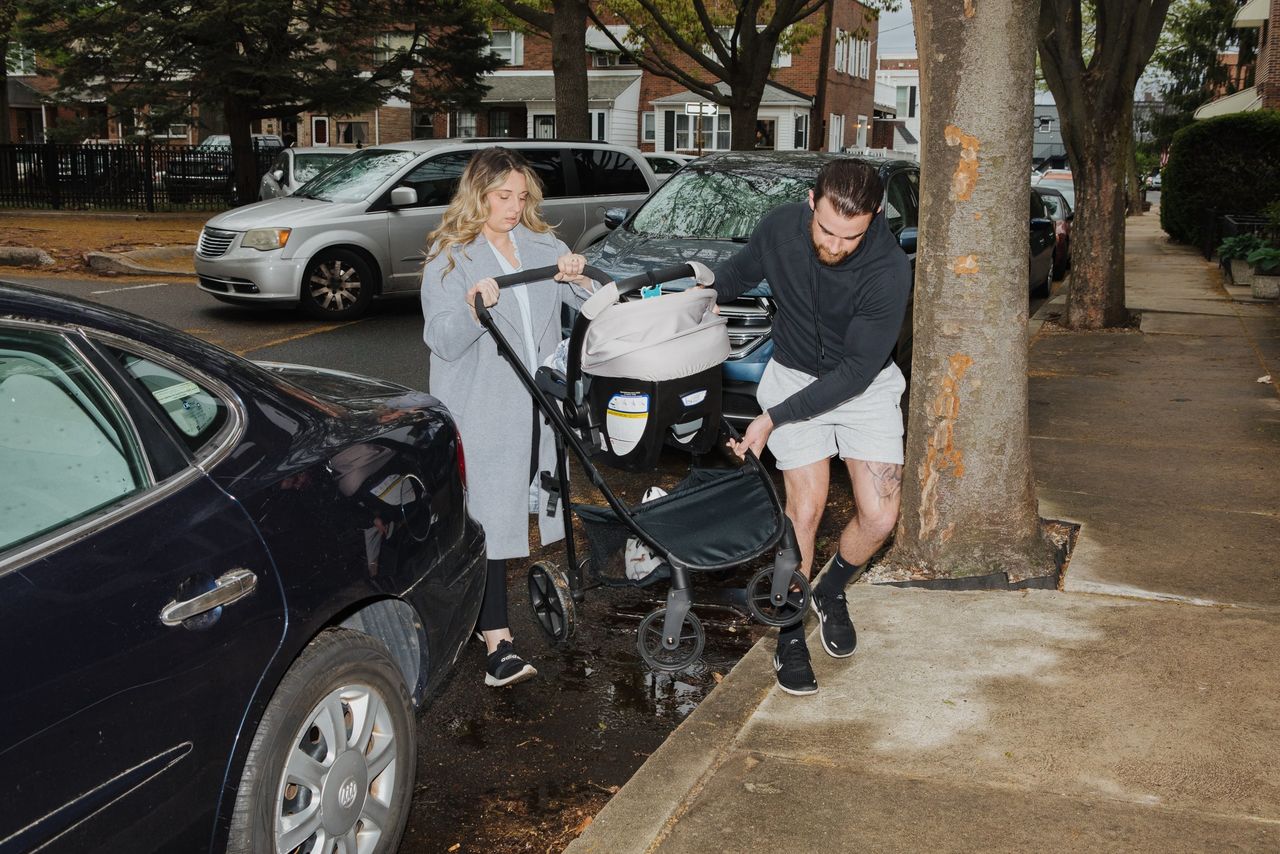Just married and with a newborn son, Anthony and Caitlin Fumo expected their well-paying jobs and chunk of savings to support a move closer to their parents in the suburbs of New Jersey.
But leaving their 1,000-square-foot Philadelphia rowhome means borrowing with rates around 7%—to buy in a market where the typical home value has jumped 40% since the start of 2020. Their 3.85% mortgage costs $1,500 a month. They are looking at payments of around $4,000 if they move.
Friends who scooped up their forever homes during the pandemic refinancing boom, meanwhile, are able to raise multiple children and support a long-term mortgage comfortably, said Anthony, a 31-year-old accounting consultant. A longtime rule of thumb in American homeownership—buy a starter home, then move up to a bigger place—doesn’t feel like it works anymore.
“It feels like we make too much money to still feel like we’re behind,” Anthony said. Missing the huge repricing “affects all my decisions.”
The rules have changed
America has come to expect ever-higher prices on houses, stocks and a swath of other financial assets. Civic leaders and corporate executives routinely praise rising home prices and rallying stocks as signs of widespread economic well-being.
But those rising asset prices are wedging an increasingly large gap between the wealth of older generations and their children and grandchildren. The gains are heavily concentrated in older Americans who are already homeowners and who invested many years ago when prices were lower.
For those looking to embark on the American dream today, it is further out of reach than ever. Home-buying affordability fell last year to the lowest level since 1985, according to a National Association of Realtors index. The median household now needs more than 40% of its income to cover payments on a median-priced home, according to the Federal Reserve Bank of Atlanta.
Hopes that the Fed would cut interest rates helped lower mortgage rates and unlock the housing market for a few months, but stubborn inflation has sent rates back above 7% and home sales sliding.
In 2022, when the oldest millennials were about 40 years old, 61% of people ages 35 to 44 owned a home, according to the Fed. In 1989, when the oldest baby boomers were 43 years old, 66% of that age cohort owned a home.
“Our parents can’t process that this is the new norm for home prices,” said Anthony Fumo.
Real estate—the largest source of wealth among U.S. households—drives much of the divergence between older generations, who own the bulk of home equity, and younger adults, who are looking to buy their first homes.

Homes have rarely been so unaffordable
The Fed supported the housing market for years after the 2008 financial crisis, scooping up trillions of dollars worth of bonds backed by home mortgages. Easy financing conditions helped many Americans get their start into adulthood, while older homeowners benefited from rising prices.
Now, the central bank is running down its portfolio of mortgage-backed securities, helping keep mortgage rates high. But the typical accompanying drop in prices hasn’t happened.
A yearslong decline in housing construction has constrained the supply of houses, propping up prices. Homeowners who refinanced when the Fed slashed rates near zero during the Covid-19 pandemic don’t want to give up their 3% mortgages. A surge in immigration has increased the number of families looking for homes.
Until demand slows or supply increases, home prices will continue to climb. The Fed is still on its front foot trying to tame inflation, meaning mortgage rates are primed to remain expensive.
Put it all together, and many expect the wealth gap to continue widening.
Americans 55 and up grew their overall assets to a record $114 trillion by the end of last year, up from $84 trillion just four years ago, according to Federal Reserve data. That accounts for nearly 70% of all households’ $166 trillion. Their share sat at 51% three decades earlier.
Working-age adults, meanwhile, have steadily lost share of America’s wealth. Households under 40 have less than $15 trillion, or a 9% slice of overall assets, well below the 14% they notched 30 years ago. Americans ages 40 to 54 own less than a quarter of all households’ assets—they had nearly 40% in 2001.
Relatively little of the stock market’s furious rally is available for Gen X, millennials and Gen Z.
Those age 55 and up hold about $31 trillion of the $40 trillion in corporate equities and mutual funds owned by households.
Different economies for different generations
Chris and Jennifer Mulder, in their mid-40s and raising three children in Alexandria, Va., consider their timing very lucky.
Chris Mulder bought his first house in 2003 while stationed in Georgia as an instructor pilot in the U.S. Air Force. Whenever he was relocated within the U.S., he bought a new home and rented out his old haunts.
The two began refinancing their mortgages during the pandemic, when rates dropped sharply. They have also benefited from rising rents, a corollary of the crunch in housing supply.
“Originally, renters only covered my mortgage payments and taxes,” Chris said. “Now, the cash is flowing.”
Whenever he and Jennifer, an officer in the Air Force Reserve, transition out of the military, they plan to continue contributing to national security. But they don’t feel pressure to get rich off whatever that may be, as passive income sources like their rental properties give them financial flexibility.
“Any extra income we earn, that’ll be gravy,” Chris said.

‘Dinner costs far more now’
Many Americans say they are fortunate to have built their wealth during years when asset prices multiplied, or rates were lower.
Chris Landeck is doing great, despite the high-rate economy. He is worried, though, that the cost of living is crippling for those with few, if any, assets.
A retired petroleum engineer in Brenham, Texas, Landeck paid off his first mortgage long ago. He has also helped his adult children manage their mortgage expenses to pay off the principal as soon as possible. He hammers home the need for frugality and low debt considering how high rates have climbed. He wouldn’t dream of borrowing money now.
“People are seeing prices jumping all around them, but then they turn on the TV and see the stock market at all-time highs,” said Landeck, 68. “That doesn’t offset that dinner costs far more now than it did a few years ago.”
Write to Eric Wallerstein at [email protected]
News Related-
Russian court extends detention of Wall Street Journal reporter Gershkovich until end of January
-
Russian court extends detention of Wall Street Journal reporter Evan Gershkovich, arrested on espionage charges
-
Israel's economy recovered from previous wars with Hamas, but this one might go longer, hit harder
-
Stock market today: Asian shares mixed ahead of US consumer confidence and price data
-
EXCLUSIVE: ‘Sister Wives' star Christine Brown says her kids' happy marriages inspired her leave Kody Brown
-
NBA fans roast Clippers for losing to Nuggets without Jokic, Murray, Gordon
-
Panthers-Senators brawl ends in 10-minute penalty for all players on ice
-
CNBC Daily Open: Is record Black Friday sales spike a false dawn?
-
Freed Israeli hostage describes deteriorating conditions while being held by Hamas
-
High stakes and glitz mark the vote in Paris for the 2030 World Expo host
-
Biden’s unworkable nursing rule will harm seniors
-
Jalen Hurts: We did what we needed to do when it mattered the most
-
LeBron James takes NBA all-time minutes lead in career-worst loss
-
Vikings' Kevin O'Connell to evaluate Josh Dobbs, path forward at QB
